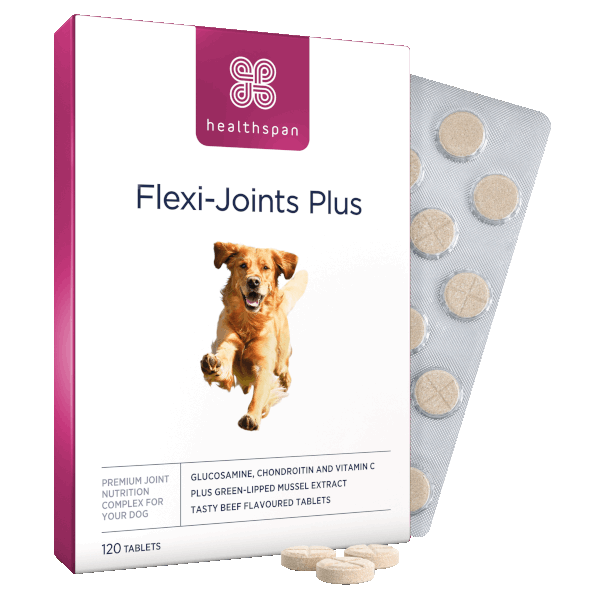Having stiff joints can impact every aspect of your dog's daily life: from being restless at night, to being slower and more reluctant on their walks. Furthermore, your previously happy dog can also become snappy or grumpy.
Here's what vet Joanna Woodnutt recommends to help dog joint pain and make them more comfortable.
🕒 6 min read
What are the symptoms of stiff joints in dogs?
Dogs with sore joints rarely yelp or whine. In fact the signs a dog is in pain (whether it's from stiff joints or anything else) are rarely always obvious, although arthritis in dogs is just as painful as it is in humans.
The only difference is that they don't know there are medications to help them, and that if they 'ask' for help by whining, we can do something about it.
Instead, you might notice your dog slowing down in general, or lagging behind on walks. They might be visibly stiff when they get up from their bed, but this 'loosens off' when they get moving.
Other signs of pain in dogs include:
- Swollen joints
- Licking or chewing at joints
- Behavioural changes, especially grumpiness
- Limping, or gait changes
Why do dogs get stiff joints?
There are several reasons for stiff joints in dogs, but the biggest – by far – is osteoarthritis (usually just called 'arthritis'). About 1 in 5 dogs over a year old have arthritis, and the percentage only increases as dogs age, with estimates of up to 90% of dogs over 5. This means that if your dog has stiff joints, the chances are high they have arthritis.
Arthritis is more likely in dogs who are overweight, have had previous joint injuries, or who have a developmental joint disease like hip dysplasia.
You might notice stiff joints more in cold weather, after over-exercise, or when your dog has been in a cramped area for some time (such as in transit), but arthritis is still the underlying cause.
Joint stiffness can also be caused by some other things such as:
- Immune-mediated polyarthritis (IMPA)
- Hip dysplasia, elbow dysplasia and other developmental diseases (which can then cause arthritis)
- Lyme disease (and other tick-borne diseases)
- Joint injury (which can then cause arthritis)
It's important to note that obesity is very common in pets, and will make all types of joint stiffness worse. Obesity also makes several types of joint stiffness more likely, so keeping your dog at a healthy weight is key.
Your local vet or nurse can assess your dog's 'body condition score', which estimates the amount of excess fat they're carrying. Regardless of their breed, age, or size, if their score is over 5/9 (or 3/5 if they use a 5-point score), your dog will need to lose some weight to reduce the risk of stiff joints.

Flexi-Joints Plus
Advanced joint support for dogs, with glucosamine, chondroitin and omega 3
- 500mg glucosamine HCl and 100mg chondroitin sulphate
- Green-lipped mussel, rich in omega 3
- Can be eaten whole or crumbled into food. Perfect for older dogs
What's causing my dog's stiff joints?
If your dog is stiff, you should go to the vet to get a diagnosis, or at least to rule out some of the causes that require a different treatment protocol, like Lyme disease or IMPA. Unfortunately it's impossible to get a diagnosis without examining a dog thoroughly and doing some tests, as the causes of joint stiffness can all look very similar clinically.
If the stiffness has suddenly happened, the chances are higher that your dog has IMPA, joint injury, or Lyme disease, but it doesn't rule out dysplasia or arthritis completely. Many dogs have an undiagnosed, low-grade arthritis that has a sudden 'flare', seemingly appearing out of nowhere.
Once you have a diagnosis for your dog's stiff joints, there are lots of home treatments you can try that may help them.
1. Give them the prescribed medication
There are a lot of different medications for joint pain and arthritis in dogs. Your vet will normally start with an NSAID (a type of anti-inflammatory pain relief drug), then as the condition progresses, they can add several other medications alongside this.
Nobody likes the idea of long-term medication, but to relieve pain in dogs, it's important you give it – at least at first.
A phenomenon known as 'pain wind-up', which happens when pets are used to being in pain, means that they come to expect pain, and their body becomes more sensitive to it. By giving their prescribed medications on-time and reducing that pain, you're not only helping them feel better now, you're also winding back those pain receptors to normal levels of sensitivity.
Most will need to continue on medication for life, but in some dogs the dose can be reduced once other non-prescription treatments have had a chance to take over.
2. Make some adaptations to your home
Stiff joints are prone to injury, and each step can be sore. Your dog will be able to do more of their favourite things with some minor home adaptations to help them move around more comfortably.
For example, you might want to make sure everything they need is on the ground floor, so they don't have to navigate the stairs. For small steps into the garden, a ramp might help. You can also get ramps for the car, and onto your bed and sofa.
If you have hard floors, skidding and sliding around can be extremely painful, so try some non-slip matting on major walkways. You might also want to take a look at your dog's bed. It should be comfortable, warm, and easy to access, so avoid anything with high sides.
3. Weight loss
It is essential you check your dog's body condition score with your vet, and put them on a diet if they are overweight. Excess fat causes sore joints to be made worse due to the increased pressure on the joints. In addition, inflammatory proteins are made in the fat, which can impact even non-weightbearing joints.
4. Regulating exercise
Unfortunately for the Border Collies of the world, chasing after a ball is bad for dogs who suffer from joint stiffness. In fact, any intense physical exercise with twists and turns increases the chance of stiffness and injury. With arthritic dogs, moderate and regular exercise is key.
Try taking them for three ten-minute walks rather than one half-hour walk. Finding other ways to stimulate them, such as with puzzle toys and scent-filled walks, is also a good idea to keep them entertained, without putting pressure on the joints.
5. Start joint supplements
Joint supplements contain nutritional additives that can help joints function at their best. Look for supplements containing omega 3s, as these natural anti-inflammatory compounds have good evidence that they help sore joints.
It's important to note, however, that they can take several weeks to show an effect, so it's best to start them as soon as you suspect a problem with your dog's joints.
Check with your vet
Stiff joints are very common in dogs, with arthritis being the most common cause — but the signs a dog is in pain are often easy to miss. Keep an eye on your pet (especially during the winter months and as they're getting older) and go to the vet for diagnosis, as some causes of stiff joints might need other treatments.
Once you have a diagnosis, many cases can be managed at home, particularly with the help of supplements, which are a useful way to aid the natural function of joints.








